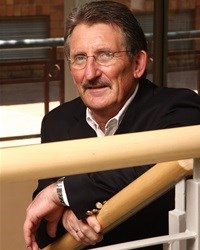Africa is on the brink of an energy revolution which will transform lives across the continent, if decision-makers can fully grasp and advance the technological and other innovations on our doorstep, according to global consulting engineers and scientists, SRK Consulting (Africa).

Roger Dixon
“Rolling back poverty and boosting growth by getting affordable electricity to all households is now a more realistic possibility than ever before,” said SRK corporate consultant, Roger Dixon, “especially with fast-developing renewable energy technologies to build upon.”
Dixon highlighted the developmental impact of access to electricity at household and community level, especially in the era of mobile and digital communication.
“Electricity is the first step into the digital age, facilitating improved levels of learning, enterprise, healthcare and communication,” he said. “In many remote areas, electricity in the household also heralds a new culture of efficiency in which people can spend time on more productive activities instead of fetching firewood or water.”
He also highlighted electricity’s vital contribution to improving educational access and quality, which were in turn linked to economic performance, employment and more sustainable levels of population growth.
According to the African Development Bank (ADB), the continent loses 4% of its gross domestic product due to lack of electricity – with over 645 million Africans living without it. Electricity use per capita averages 181 kilowatt hours (kwH) in Africa, compared to about 13,000 kwH in the US and over 6,500 kwH in Europe.
Affordability
Electricity is also often unaffordable to Africans, according to the ADB, which estimates that a person living in northern Nigeria pays up to 80 times more per unit of energy than a resident of London or New York.
“The urgency of this challenge is clear from the ADB’s plan to spend US$12 billion in the energy sector over the next five years and leverage a further US$40-50 billion,” said Dixon. “In South Africa, government expenditure on energy projects – mainly from Eskom – is expected to exceed R180 billion over the next three years, making up more than 20% of public sector infrastructure spending. In addition, government is also considering potential investment in nuclear power.”
He said renewable energy sources will be a cornerstone of this economic revolution, as Africa’s potential in wind, solar and hydropower is released by the quick pace of technology.
“But we also need to innovate our models of energy generation and distribution, providing legal, policy and technical support for private sector investment and exploiting opportunities in locally-focused energy schemes alongside a national grid,” he said. “Our experience at SRK is that engineering studies must integrate closely with social and environmental requirements to ensure that projects proceed smoothly; governments must facilitate with a conducive regulatory framework and efficient permitting.”
Renewable energy’s share of South Africa’s installed electricity capacity has leapt from zero to 4.5% since 2010, on the strength of government’s Renewable Energy Independent Power Producer Procurement Programme (REIPPPP).
“This bold initiative breaks new ground and proves that renewable energy is both affordable and well-suited for public-private partnerships in Africa,” said Dixon. “It also showed that solar and wind power offer unprecedented opportunities to reach remote areas with electricity, without necessarily being linked to a national grid.”
South Africa has recently become one of the world’s top 10 countries generating power from solar photo-voltaic sources, and is now the largest wind-energy producer in Africa – with capacity exceeding 1,000 MW.





















